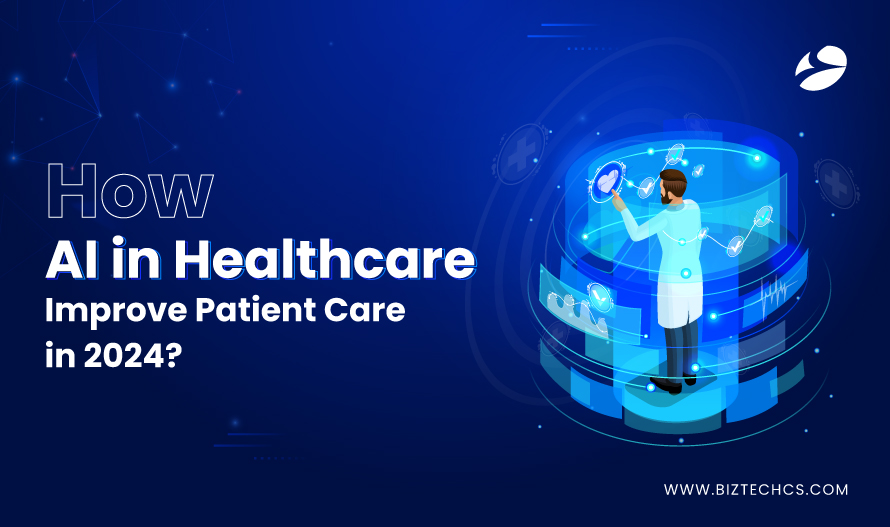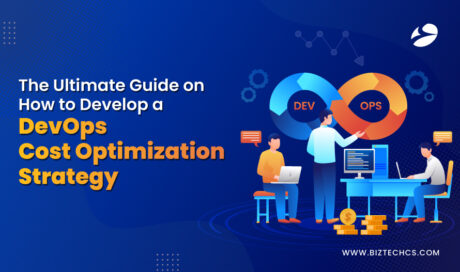
https://www.bizztechs.com/blog/ai-in-healthcare/
Summary
Artificial Intelligence (AI) can be better defined as the intelligence exhibited by machines (mostly computer systems). The machine is trained by studying the cognitive functions of a human brain to simulate human-like decision-making capabilities.
While artificial intelligence is no new term in 2024, the significance of AI in Healthcare is something that businesses are still pondering upon. Like AI has revolutionized the areas of Information Technology, customer support services, eCommerce, and decision-making, it has also several benefits in the healthcare sector and can elevate the level of patient care.
In this blog post, we will delve deeper into the benefits of AI in Healthcare and how it is helping healthcare institutions and professionals improve patient care.
Application of AI in Healthcare
For those who wonder How is AI used in Healthcare and whether there are any real-life benefits of implementing AI, you should check out these applications of AI in healthcare.
- Digital Health Monitoring
Let patients seek medical consultation from prestigious healthcare professionals remotely. With AI-powered telemedicine software for virtual consultation with doctors, allow your patients to connect with doctors from everywhere and seek necessary medical help. The various digital health monitoring applications include patient-engagement chatbots, appointment schedulers, wearables, mobile apps for patients and healthcare providers, and so on.
- Drug Discovery
The global drug discovery market size was at an estimated range of $60.31 Billion in 2023 and is expected to grow at a 9.22% CAGR. When researchers and healthcare specialists are fighting tooth and nail to discover drugs for various chronic diseases, the introduction of technologies like AI and ML in Healthcare can help accelerate the process, improve the effectiveness of therapies, and reduce the costs of drug design.From using AI algorithms to analyze vast databases to identification of biological targets for drug design, it can help in several ways. Machine learning can help with designing molecules that react with the target efficiently.At the same time, AI algorithms can predict potential side effects of a drug even before clinical trials begin. Thereby, it improves the planning and execution of these trials far and wide.
- End-To-End Clinical Solutions
The use of AI technology in various phases of clinical research and patient care is immense. From managing huge amounts of Electronic Health Records (EHR) to data collection and monitoring and regulatory compliance & documentation to improving patient engagement, AI ML in Healthcare has several noteworthy applications.
- Personalized Treatment
Healthcare institutions can get an AI-powered software application developed that analyzes a patient’s condition, past medical records, and current health condition to suggest therapies and treatments without any side effects. The personalized treatment helps patients seek efficient medical recommendations around the clock.
- Robotic Assisted Surgery
Even the surgical department can improve the efficiency and accuracy of surgical treatments with the help of Artificial Intelligence. The robot-assisted surgery aims for greater precision as surgeons make use of a robotic arm that integrates a camera alongside surgical instruments.While the robotic hand replicates a surgeon’s hand, it is controlled by the surgeon via a console where they get a 3-dimensional high-definition view of the surgical site. The AI also helps assess pre-operative data (reports from scans, MRIs, etc.) and suggest optimal surgical options by analyzing datasets and similar cases.
- Medical Condition Forecasting
AI in Healthcare companies is enabling them to forecast the medical conditions of patients. The AI algorithm analyzes vast amounts of medical data to identify and predict any likelihood of developing certain diseases.
- Image Analysis Software
AI applications in Healthcare also include medical image analysis software. It helps radiologists with accurate diagnosis of disease and suggests optimal treatment plans without any human errors.
- Chronic Disease Management
AI use in Healthcare enables healthcare professionals and patients to manage chronic conditions such as heart conditions and diabetes. Patients can take preventive measures to keep their health optimal and professionals can deliver preventive care treatments.The use of AI technology in Healthcare enables medical professionals to take better care of patients and elevate the standard of patient care. Furthermore, let’s check the various AI trends that are ruling 2024 and beyond.
Types of Artificial Intelligence for Healthcare
As we saw the various AI ML use cases in Healthcare, it is evident that AI is here to revolutionize the healthcare industry for better patient care, accurate diagnosis of disease, and suggestion of optimal treatment plans.
Now that you are familiar with the various advantages of AI in the Healthcare Industry, let’s explore the various types of AI that you can put to use for various healthcare operations.
Machine Learning
It is a branch of artificial intelligence that utilizes data and algorithms to make decisions or predictions without being programmed explicitly. In the Healthcare sector, there can be various uses of machine learning such as:
- Predictive analytics for forecasting patient outcomes.
- By studying the correlations and patterns in medical data, it can help with the diagnosis of disease and prognosis.
- Machine learning technology helps practitioners tailor personalized medicines for patients, elevating patient care.
Internet of Medical Things (IoMT)
IoMT is a subset of IoT where a collection of medical devices and hardware systems are connected with the Healthcare IT system via a computer network. These devices are used for monitoring patient health, informing of crucial data, notifying healthcare professionals about appointments, and so on.
- With devices such as advanced heart rate monitors, wearable fitness trackers, connected inhalers, glucose monitors, etc., healthcare professionals can continuously monitor patient health for chronic diseases or elderly care.
- Smart pacemakers or implants can help with continuous monitoring of patient health and even alert healthcare professionals of any concerns to elevate patient safety.
- Integration of IoMT in healthcare also helps with the monitoring of assets (wheelchairs, portable diagnostic devices) to optimize resource utilization and prevent loss or misplacement of assets.
- Smart medicine bottles can remind patients to take pills on time and are especially helpful for people with complicated medical routines.
Robotic Process Automation
Robotic systems in healthcare are integrated with AI to help medical practitioners attain a higher level of precision and accuracy in their treatment, especially surgery.
- Robotic-powered surgery to attain greater precision in surgery.
- Rehabilitation robots help patients recover motor skills.
- Disinfection robots can help hospitals keep clean.
Rule-Based Expert System
AI programs and algorithms are written to emulate the decision-making capabilities of a human being. The algorithms and programs are coded based on certain rules set by medical experts. Implementation of such expert systems can help in:
- Diagnostic support. It helps clinics with potential diagnosis of diseases based on patient condition.
- Clinical decision support systems (CDSS). It helps with deciding and optimizing the treatment plan and also effective planning of drug design and interactions.
Natural Language Processing
NLP (Natural language processing) lets computers comprehend and interpret human language so they can extract meaningful data from unstructured data sources like patient feedback, clinical notes, research reports, etc. Natural Language Processing can be used for
- Data structuring from unstructured data by extracting information
- Sentiment analysis to understand the sentiments behind patient feedback
- Save time by reducing the manual efforts on administrative tasks and auto-generate reports.
Generative AI
The subset of AI, generative AI in healthcare can help with the generation of new data from existing content and data sets. It can optimize various aspects of research and practice, from personalized medicine to drug discovery.
- Reconstructing incomplete images, improving image quality, and generating synthetic medical images for training purposes are some of the best applications of generative AI.
- Generative AI can help produce readable and informative content for patients, informing them about how to manage their health.
- It can be used in the designing of prosthetics and implants.
- You can use generative AI to create simulation scenarios and training materials for interns.
The implementations of AI ML in Healthcare industry are plenty. And with more advancements in technology, you will find more applications of artificial intelligence in healthcare that can not just improve your productivity but improve the quality of service.
Conclusion
With robust AI ML applications in Healthcare, you can elevate the level of patient care and medical service. However, much of these trends and applications are still in the research and theoretical phase and are not being used in practice.
Nevertheless, the future of AI in Healthcare seems to be promising with such diverse AI concepts put into use. With such new subsets and subbranches of AI and equally expert developers that can leverage the potential of AI, you can devise high-quality software solutions that assist in your healthcare ventures.
With this guide, we hope you are better informed about these patient care software implementations and integrations using AI. If you want to elevate your level of patient care and extend seamless cliical offerings using AI, you can avail of AI/ML development services from a professional team of experts.
BiztechCS might be that professional team that extends AI/ML services for your healthcare institution. With our 17+ years of experience and more than 300+ professionals in our team, we can develop and customize high quality AI solutions catering to your specific business needs.
02 May, 2024
7 min read
02 May, 2024
7 min read


128

125

248